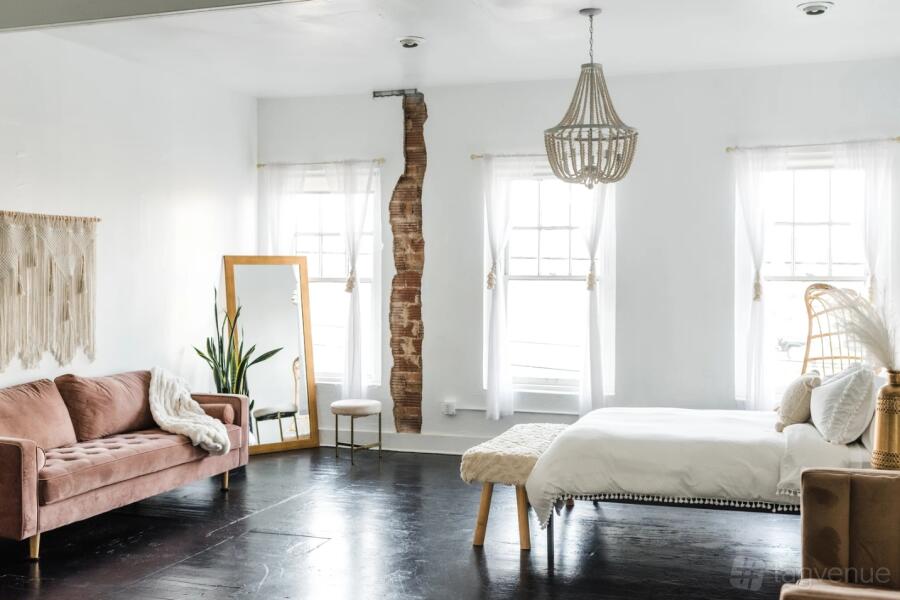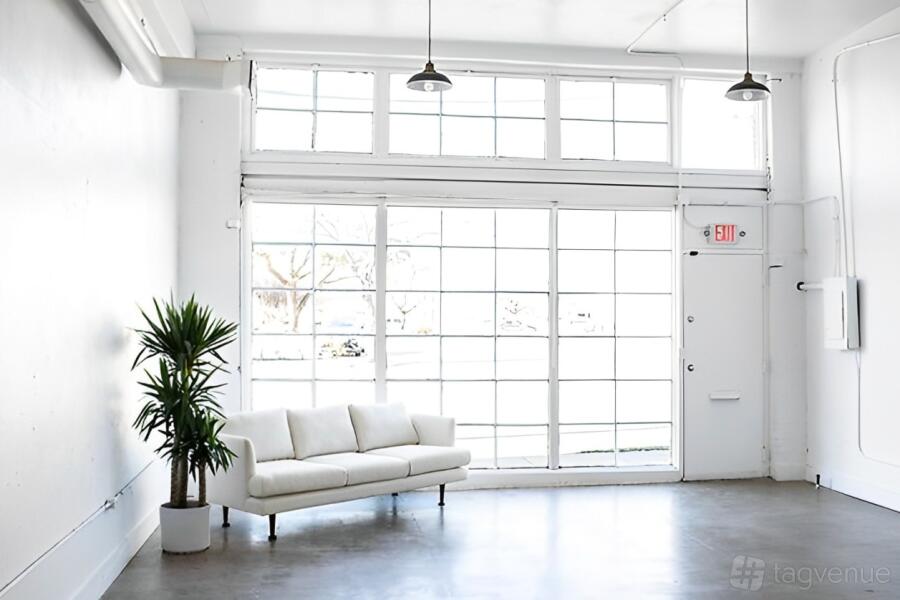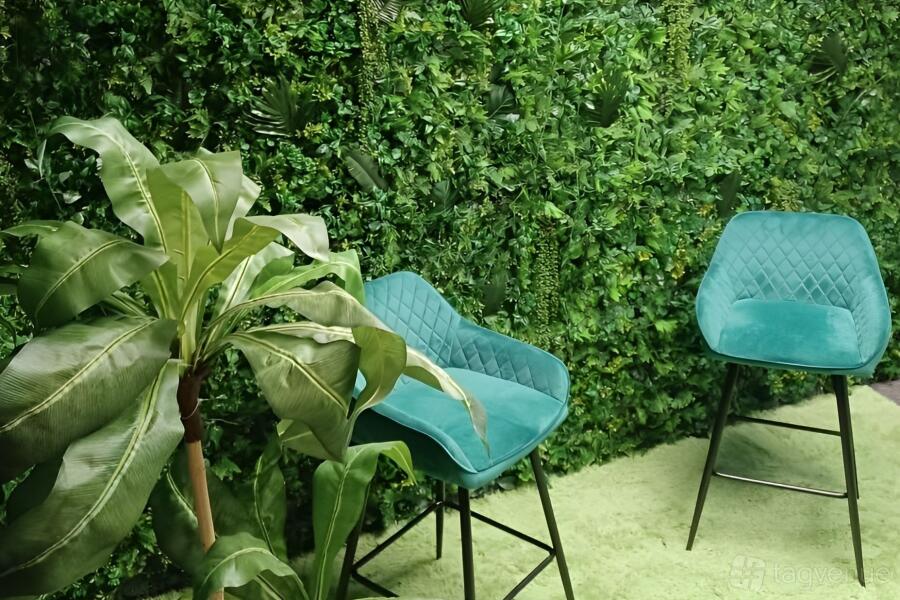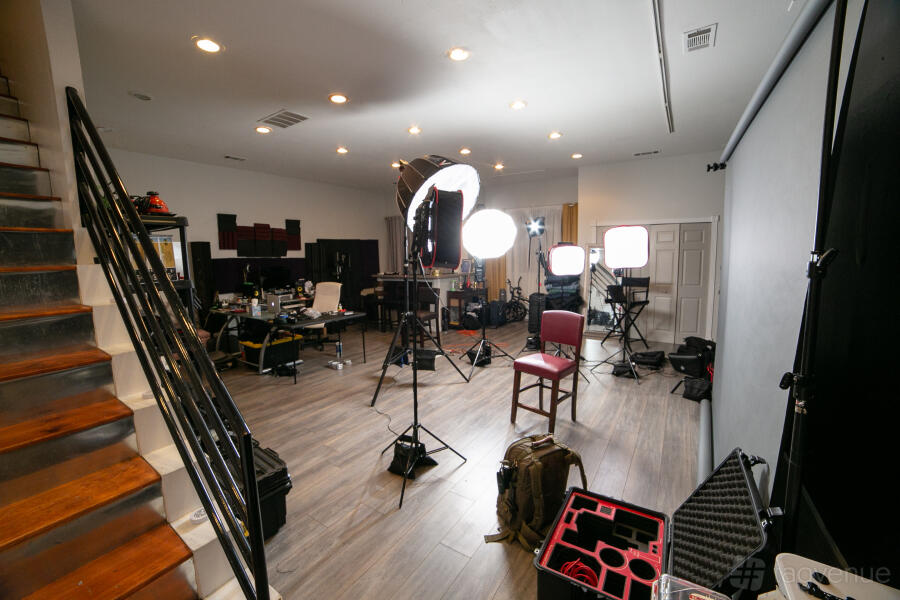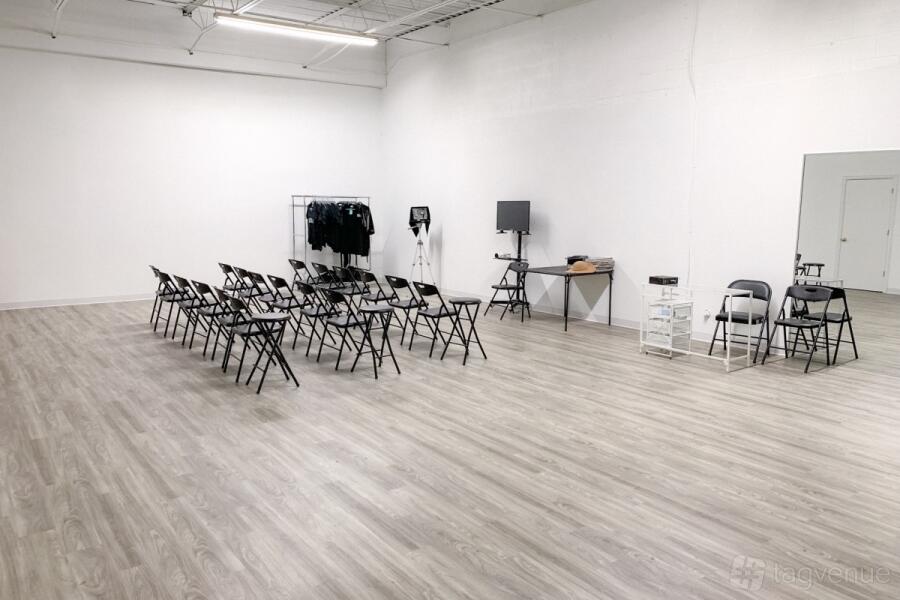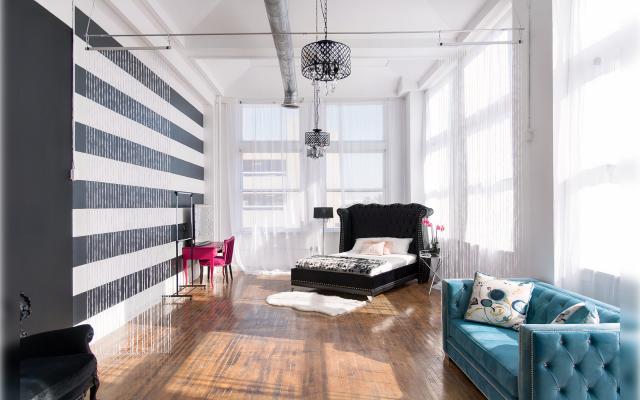Top Photo Studios in Dallas, TX
Hunting for photo studios in Dallas? Check out the professional venues that we have in our offer. Do you want to take your photos to the next level? With the right photo studio, you will be doing that in no time. The more that we proceed into the 21st century, the more people have become interested in capturing the perfect shot. That’s why at Tagvenue we partner up with only the best locations in Dallas. So what are you waiting for? Search and book one of the professional photo studios Dallas has to offer today.
-
Boudoir Studio
50 guestsThe Space on South SideDallas, TXLooking for a studio for your next photoshoot in Dallas, TX? The Boudoir Studio offers a modern, light space for shoots or filming. The studio's white walls, wood floors, and exposed brick create a backdrop, ideal for variousfrom $75
hire fee / per hour -
Modern Studio
50 guestsThe Space on South SideDallas, TXThe Space on South Side, located on Main Street in Dallas, TX, is more than just a photography studio. The venue caters to a wide range of creative professionals, including photographers, filmmakers, street artists, influencers,from $75
hire fee / per hour -
Studio 306
20 guestsStudio Rental DallasSouth Dallas, TXOne of the premier Photography Studio Rental spaces in Dallas, SRD is ideal for anything from a small table top shoot to full scale room sets. Conveniently located in the Heart of the Cedars, SRD is just minutes from downtownfrom $150
hire fee / per hour -
Entire Studio
100 guestsThe Space on South SideDallas, TXLooking for a studio for your next photoshoot, filming session, or creative project in Dallas, TX? Our venue offers versatile space for a variety of productions.from $175
hire fee / per hour -
Classic Light Studio
30 guestsLight Box DallasFar North Dallas, TXLight Box Studios makes it easy for photographers of all niches and talent levels to take their photography to the next level. When you book one of our studios, you will have your own entrance and privacy from the rest offrom $85
hire fee / per hour -
Studio 2
12 guestsThe TX StudioNorth Oak Cliff, Dallas, TXNatural light photography studios in Dallas, TX. Rentable by the hour, and designed for you to jump in and create We are located in Oak Cliff, in the historic Tyler Station building, on the south side of the building.from $60
hire fee / per hour -
Photography Studio
6 guestsJEM StudiosDeep Ellum, Dallas, TXJEM Studios is a photography studio, recording studio, and podcast studio located in the vibrant, historic district of Deep Ellum. Situated east of downtown Dallas.from $70
hire fee / per hour -
Photo Studio
20 guestsHoeber StudioNorthwest Dallas, TXHaving the best light possible is critical for incredible photography, this is why we offer a diverse range of lighting solutions. Our studio is ideal for photographers who prefer natural light.from $48
hire fee / per hour -
The Studio
6 guestsJungle RoomDallas, TXThere are no windows in the green room. We use LED lights and the overhead ceiling light, assuring good conditions for photoshoots. Quiet and secure location 24 hours / 7 days a week.from $50
hire fee / per hour -
Studio Room
10 guestsClear Motion FilmsOld East Dallas, TXClear Motion Films is a production studio specializing in documentary films and commercial work, as well as photography and videography. Our studio is equipped with all the amenities needed for a successful photo or videofrom $150
hire fee / per hour -
Design District Studio
75 guestsBella Modeling SchoolDesign District, Dallas, TXOur studio space is designed to cater to a wide range of photography needs. It features a large white backdrop, perfect for portrait or product photography, ensuring a clean and professional look for your images.from $100
hire fee / per hour -
Entire Venue
15 guestsA-List Photography StudioDallas, TXA-List Photography Studios is committed to empowering creatives, offering an adaptable space perfect for various projects such as boudoir, model, engagement, and professional branding shoots.from $60
hire fee / per hour
- 1
- 2
- 3
- 4
Budget
Event Type
Area type
Venue type
Accessibility features

FAQs about Top Photo Studios in Dallas, TX
You may be wondering what types of photos you can take in a studio. Of course, you can shoot whatever photos you wish to, but it’s also good to know what audience you are creating for. You can do product photography, fashion, editorial, still life and portrait photography. In every niche you will find artists who can inspire you, and online guides with rules to follow to create the perfect shots.
Take a look in the Old East Dallas neighborhood. There you can find a beautiful The Lightroom Studio. If you need an artistic vibe and a romantic natural light, this can definitely be your top pick, with a hire fee starting at $75 per hour. Head to Addison if you want to rent Main Studio at Camera Ready Studio, perfect both for photoshoots and video production. The hire fee starts at $800.
Each venue that you decide to book will require you to sign a contract. It is an agreement between you and the host, and you should make sure that all the important information is written down. Who covers the cost in case something breaks, how long will you be renting the studio until, what happens if you go overtime, etc.
You should always have insurance when renting a studio. You can have many problems if anything happens to anyone inside or if something gets damaged out of your own fault. Insurance covers a lot of unfortunate events, just make sure to know what exactly is covered by the company you are insured by. Better to spend a small amount and have a clear head, than worry later.
Your Guide to Renting Photo Studios in Dallas, TX
Are you looking to tell a beautiful story through your photography? Perhaps you’re shooting a campaign for a fashion brand, or doing some product photography. Or maybe you’re just looking to make your portfolio bigger, and your skill set better. Studio photography gives the perfect opportunity to do all of the above and more. With Tagvenue’s locations here in Dallas, you’re bound to find the ideal photo studios for your upcoming projects.
Mastering studio photography may not be easy at first. There are lots of technical terms which you need to remember by heart. Aperture, shutter speed or ISO? You’ll be chanting these in your sleep soon enough. But all of these things are seriously important if you want to take photos good enough for the masses, and make a name for yourself in the business. The good news is that although everything is so competitive these days, there is also a huge demand for photographers and their art. So whether you’re in Dallas, New York or LA - the internet is here to help you out and make your photos well known across the world. On that same note, Tagvenue is here to assist you in choosing the ideal location for your photo shoot. Get yourself ready to search and book photo studios in Dallas, and make your next photo session something to look forward to.
We cover a lot in this article, so grab yourself a cup of tea, and get started with the lecture. Feel free to skip the newbie section if you’re already an advanced photographer.
Photo Terminology for Newbies
Some terminology is still confusing, even for intermediate photographers. We prepared a couple of most popular terms, and some explanations, just so you can have an easier time if you’re starting out.
- Manual - you can capture photos in one of the two modes - Automatic or Manual. Automatic modes are the camera’s standard presets, which are already pre-installed inside. These will be the functions like portrait or landscape mode. If you want to be in complete control of your photos, you should choose to shoot in manual. This gives you complete control over ISO, aperture, shutter speed, etc. In the photography world, the photographer who shoots in manual is usually distinguished as the professional photographer.
- ISO - this is your camera’s sensitivity to light. In simple terms - it makes your photos light or dark. The higher the ISO the brighter your photos, the lower the ISO the darker your photos become. This mode can give you a bigger freedom to shoot in darker surroundings, or help you play around with other functions. ISO scale usually ranges between 100 to 1600. Just a warning - the bigger the ISO the bigger the grain/noise on your photos (it gives your photos that ‘sandy’ look).
- Aperture - is the part of the camera that controls the hole where light enters. A higher aperture means that there will be less light traveling into your camera. A lower aperture means that more light goes in. If you want everything in focus in your photo, then having a higher aperture is better. If you shoot in dim surroundings, then a lower aperture helps with capturing more detail. Look for f-numbers, like f/1.2, in your camera to find the aperture.
- Shutter Speed - the speed at which the shutter closes. The faster it does, the more still your photo becomes. The slower the shutter, the more movement your photo is going to have. A slower shutter speed results in blurry photos - which usually for beginner photographers is not a great option. However, as you advance in your photography journey, you get to experiment and create interesting effects.
- White Balance - have you had problems with photos turning too yellow or too blue? Do you find yourself frustrated that you don’t know how to change it, and switch back to automatic mode? This happens because your camera has trouble adjusting to different light sources. The correct white balance will make the white’s in your photo look white. You can play around with the present settings or try to do it manually by taking a photo of a completely white background first, and then using it as your white balance setting.
- RAW - you can save your photos in different formats. A RAW file saves all the details in the photo, meanwhile a .jpg file compresses them. A RAW photo can be edited in a better way than a .jpg. When you open photoshop to edit your pictures, a separate window shows up, letting you move the values around and have better control of your photo.
For a more in-depth explanation, check out this basic terminology guide.
Right, so we’ve got the right vocabulary covered.
But do you feel unsure whether you actually need to rent a photo studio? We have a couple of points that you should consider when searching for a photo shoot location.
Why should I book a photo studio in Dallas?
- Once you understand all the little details of taking pictures in a studio environment - you’ll be completely in control of what you’re doing. In comparison, to being out in the open, where the weather and the source of light is constantly changing, in a studio you have the absolute creative freedom to do whatever you wish. Providing you have the equipment and the props you need. In a way, taking photographs is a carefully calculated skill, which flourishes best under the photographer’s creative abilities.
- Do you look at other people’s photos and wish that yours could look like theirs? Are you wondering why some photos have a completely different style, and you have no idea why yours don’t seem to turn out the same way no matter how hard you try? The answers to your questions could simply lie within a fantastic studio and the kind of equipment, which most people don’t come into contact with on a daily basis, most likely due to budget constraints - a green screen is usually not the first thing a starting photographer would buy, or even store in their house. When renting out a photo studio, you have the opportunity to rent a space which enables you to shoot on cyc walls - such as green screens, like we mentioned before, or white walls. The illusion of infinite space is a method used by many fashion photographers, and of course it is used for videos as well.
- You can be as flexible as you wish. The beauty of renting photo studios lies in the fact that they can look similar to each other. This way, you are able to start a photo shoot in one location and finish it in another if needed. Do you have to travel to clients, or change locations during the shoot? In a controlled environment you can remake a scene many times, and you’re not restricted to certain times of day, or other limitations.
Ok, so now you know why it’s a good idea to rent a photo studio in Dallas, and you’re looking for a location to book. There is a lot of information on every space, so you feel a little overwhelmed with what you should look out for. Would you like some help with that? We already know the answer.
So, what should I look for when renting a photo studio, you ask?
- The location - is one of the key factors when booking a studio. Do you need it to be in a certain part of the city? Dallas is a big metropolis, and with that in mind, you might wish to rent a studio in a particular part of town. If you’re part of a studio production, or a company, then renting a place located an hour away from everyone could be a poor idea. Somewhere in one of the main districts will be a better choice. The Main Street District is a popular choice. However, if you find a studio which is perfect for the shoot and cannot be substituted by any other, then perhaps the journey could be worth taking.
- The price - is your budget tight? You can find some affordable options on Tagvenue, as well as more expensive ones. Check how the price is impacted by the location, and what’s included in the cost. Is it worth it to pay more and have better equipment, for example? Or would it make more sense to rent a venue which only offers the space, because you have a lot of the equipment yourself (like a unique, interesting venue which might not have equipment on offer). Of course, sometimes the price is for the prestige of the location, or the fact that it’s in the middle of the city. Compare the prices for any amenities that are included, and choose the option that suits your needs.
- Equipment - the studio should offer two types of lights - strobe lights and continuous lights. When it comes to strobes, it’s good to have light modifiers ready to diffuse the lights. These can include studio umbrellas or softboxes. The modifiers change the strength of the light stream, and soften out the edges where the shadows form. Don’t forget about light meters, which will precisely measure your flash to fill in the dark parts of the photo. Remember that each light requires its own light stand that will support its weight. A camera tripod will also come in useful, for perfect still images. Get some gaffer tape, which is made precisely so that it leaves no residue behind when taken off. This way you can stick things without having to worry about destroying any equipment. What type of backdrop are you going to use? A green screen, a cyc wall or something with a bit of an edge - like a brick wall, or a wall with a different texture.
- Extra facilities - what else is inside the studio? What does the host include in the offer? Check if there are any back rooms such as a kitchen and a bathroom if you’re planning to spend the whole day there. Or is there easy access to parking if you decide to get to the place by car or a van? Will you be needing wheelchair access? Write down whatever extra things you might require, and check with the host if they have these facilities on offer.
So, to recap. Make sure to ask all the important questions, learn before and as you go, and read everything you have to sign. The last one is probably the most important. We hope that you feel more comfortable with your upcoming photo studio renting experience. The above tips are just some general guidelines, and we recommend you do some more extensive research. We hope that you found this information helpful, and wish you luck for future projects. Now go and book one of the best photo studios Dallas has to offer!
